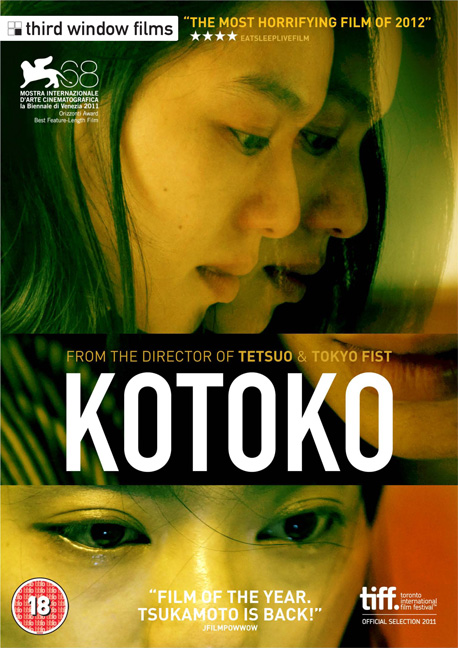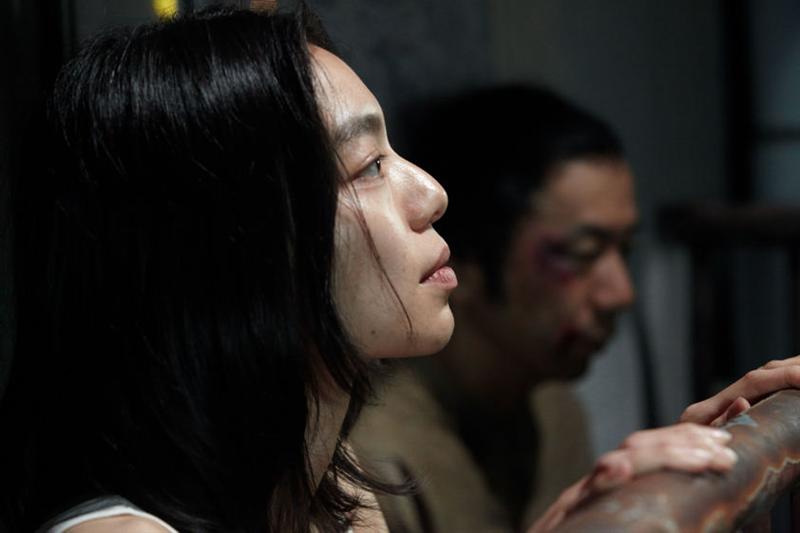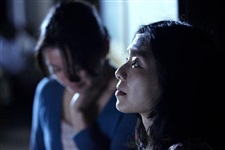Kotoko (2011)

Kotoko is a young single mother, whose paranoid schizophrenia means that she is prone to hallucination, confusion, self-harming and violent outbursts, making her a less than ideal parent. Eventually the authorities realise this and her infant son is taken away from her. A chance encounter with an author leads to a relationship which brings some stability to her life, despite being based on a somewhat abusive/masochistic dynamic, and eventually she is allowed to bring her son home. But is she really ready for the responsibility of caring for an infant child?
KOTOKO is essentially a character study of a person with severe mental illness. Kotoko's hallucinations and instability mean that the viewer can never be entirely sure how much of what is happening on screen is happening anywhere except in Kotoko's head. Shinya Tsukamoto's films are often quite hallucinogenic, and his techniques of camera movement, editing and sound design have been well honed in that direction - he is adept at creating an atmosphere of surreal paranoia, dread and terror - which is a fair description of Kotoko's mental state a lot of the time.
Tsukamoto is arguably the father of modern Japanese alternative cinema, a unique and distinctive voice (though comparisons with David Cronenberg are unavoidable). Here he writes, directs, edits and acts, as he does in several of his films. Singer Cocco also has an active role - apart from playing the lead character, she is credited as co-writer, art director and composer for the film.

I wasn't quite sure what to make of KOTOKO... I can't say I enjoyed it all that much, but can't say that it was because of any fault in the film particularly... it just didn't engage me. I found it interesting on an intellectual level, but most of the time I found myself thinking more about the effectiveness of Tsukamoto's sound design, or what a challenging role it must have been for Cocco, and how brave she was to take it on. At no point did I find myself thinking "Kotoko's story is interesting" or "I care what happens to Kotoko and her son"... there was a definite detachment, no engagement at all on an emotional level. Whether this was the film's fault or my fault is hard to say though. The fact that significant parts of the film are revealed to be hallucinations meant that accepting anything that happens on screen as "real" very quickly becomes inadvisable. Whilst this is indeed the point, and we are supposed to accept that what we are seeing is Kotoko's perception of reality, in this case it had the effect of putting up a barrier between myself and the film which meant it went in on a purely intellectual level.
I have had no trouble enjoying films which explore a character's internal world before, including some of Tsukamotos, but I can't say whether my failure to do so with KOTOKO was due to any fault of Tsukamoto's or just that it did not gel with my mood or expectations. I knew nothing about the film going in other than the title and the fact it was a Tsukamoto film, so that basically defined the length and breadth of my expectations... nothing in the film conflicted with those expectations (it is indeed a Tsukamoto film called KOTOKO), so unless it was simply a lack of appropriate expectation that influenced my experience it's hard not to conclude that the film itself is at fault somewhere along the line.
I can't pinpoint where that might be though, there's nothing wrong with the technicalities of the film on any level. Cocco's performance is exceptional (I've since read that the story and character are based on her own real life experiences with mental illness), and Tsukamoto's visuals, audio and editing are as skillful as ever... but for me, at least, the end result was not that interesting.
My ambivalence might lead you to conclude that I am almost as unreliable a witness to the film as the film is to objective reality, but I think that it is probably an intrinsic property of the film itself that it will induce such ambivalence. The world in which Kotoko lives is too fractured and internally inconsistent for the viewer to empathise with her, and I do not think the film asks us to - even as it subjects us to a particularly intimate tour of her mind. I'm not entirely sure what response the audience is supposed to have to Kotoko's plight though... for me it was a pretty cold assessment that she belonged in an institution, which formed very early on in the film and was not changed one iota by subsequent developments.
Your mileage may vary, as they say :-)
Cast
Crew
| Director | |
|---|---|
| Writer | |
| Cinematographer | |
| Editor | |
| Soundtrack |
Notes
all images Copyright Third Window Films






